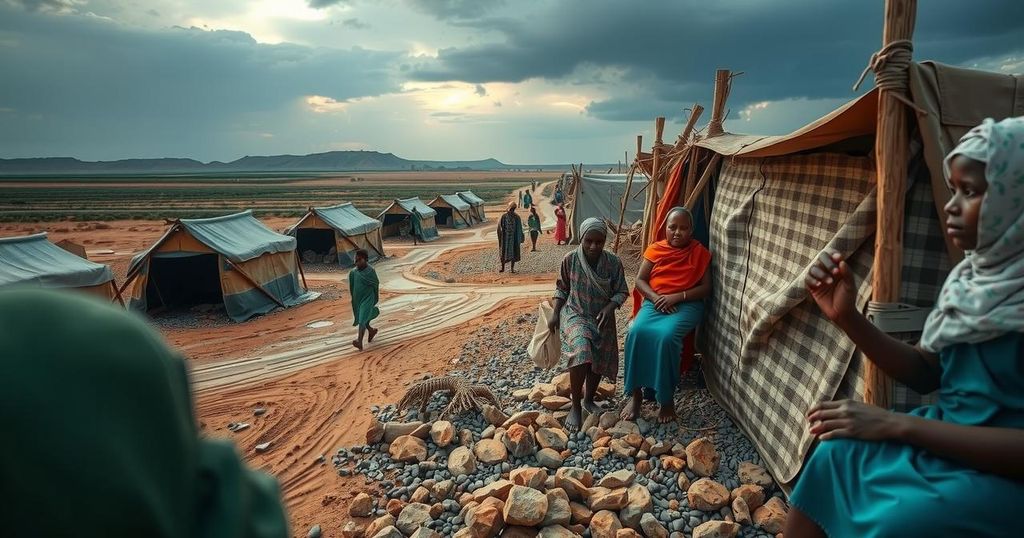In 2024, severe flooding in East Africa has caused a new wave of climate refugees to seek refuge in camps like Dadaab. A report by the Environmental Justice Foundation highlights the increasing displacement due to climate disasters, particularly affecting Somalis who have contributed minimally to global emissions. The camp’s population has surged as thousands flee environmental devastation, raising urgent calls for international humanitarian response and climate justice.
The Dadaab Refugee Camp in Kenya is witnessing an unprecedented influx of climate refugees as a result of severe climate disasters in the Horn of Africa. The Environmental Justice Foundation (EJF) has published a report highlighting the correlation between global warming and climate-induced migration. Flooding and persistent droughts have worsened living conditions, exacerbating the displacement of individuals and families who have contributed marginally to the global carbon emissions fueling this crisis. In recent years, extreme weather events linked to climate change have led to a 38% rise in internal displacement, with over 32 million people affected in 2022 alone, according to EJF’s findings. As the number of refugees in Dadaab skyrockets—growing from 234,000 in mid-2022 to 320,000 by early 2023—the camp serves as a stark example of the human cost of climate change. This exponential increase can be attributed to food insecurity, loss of livestock, and ongoing conflicts. Residents at Dadaab, many of whom are agro-pastoralists, shared heart-wrenching stories of losing their livelihoods due to droughts that decimated their crops and cattle. Halima Hassan Ibrahim, a single mother residing in the camp, noted the devastating impacts: “We had ten cows and 50 goats… I’m a mother and a father for my kids, and I don’t have anything for them.” Such narratives illustrate the urgent need for international assistance and intervention. Furthermore, the consequences of climate change are not limited to displacement; they include severe health crises, as floods in 2024 have led to outbreaks of measles and cholera in the camp. EJF’s report emphasizes the importance of addressing the needs of climate refugees as a pressing humanitarian concern. Steve Trent, the CEO of EJF, expressed the urgency of this situation: “The significant loss of life, forced displacement and widespread suffering caused by the climate crisis… is a choice.” He underscores the need for the international community to act decisively to protect climate refugees and address the systemic issues causing these crises which are disproportionately affecting those least responsible for climate change. In light of these developments, it is paramount that global leaders prioritize the well-being of vulnerable populations and formulate policies that recognize the rights of climate refugees. By doing so, they can ensure a sustainable and equitable future, free from the harms of climate change. Ultimately, the EJF report illustrates the interconnectedness of environmental justice and human rights, stressing that an equitable response to the climate crisis is essential to safeguard the futures of those facing the dire consequences of climate-induced displacement.
The context of the climate crisis is strongly pronounced in the Horn of Africa, particularly in Somalia, where climate refugees are emerging as a significant humanitarian challenge. As extreme weather events become more frequent and severe due to climate change, millions are forced to flee their homes, often seeking refuge in overcrowded camps that are ill-equipped to handle the influx. The link between global warming and increased migration trends has become a focal point in discussions about climate justice and international responsibility for defending the rights of those displaced.
In conclusion, the situation of Somali climate refugees at Dadaab exemplifies the urgent crisis created by climate change and its effects on global migration patterns. The EJF report underscores the responsibility of the international community to protect climate refugees and take meaningful action to mitigate the impacts of climate change. Addressing the root causes of climate-induced displacement and recognizing the rights of those affected is crucial to fostering a just and supportive global response to this pressing issue.
Original Source: ejfoundation.org






